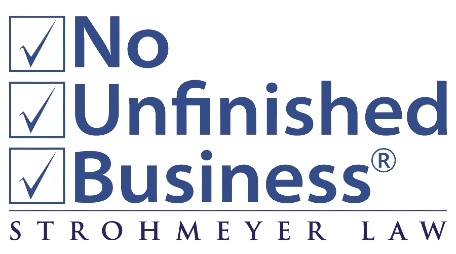I Received Checks for Someone Who Died. What Should I Do?
If you received checks for someone who died, there are solutions, but they may not be quick. It’s a common problem, and I’ll explain what needs to happen to get it resolved.
What to Do When You Receive a Check in the Name of a Deceased Person
It’s not uncommon to receive a check made out to someone who has passed away. This situation can arise in many different scenarios, including benefit payments or payment for services rendered before the person’s death. However, you can’t simply deposit the check into your account, even if you’re the only beneficiary of the decedent’s estate. In this blog post, we’ll discuss what you should do if you find yourself in this situation.
The Check Belongs to the Estate Now
The first thing to understand is that the check belongs to the decedent’s estate, not to you. As such, you’ll need legal authority to cash or deposit the check. Typically, this requires being named as the executor or administrator of the estate via the probate process. If you’re not in either of these roles, you’ll need to get the check signed by someone who is authorized by the court to do so on behalf of the estate.
Have a probate issue here in Texas? Schedule a call with Strohmeyer Law to get results.
Can I Have it Re-written?
In some cases, you may be able to have the check reissued in the name of the estate or another beneficiary — it might be worth asking the check’s issuer if this is possible. However, in most cases, the check will need to go through the probate process before it can be used to repay any remaining creditors and paid out to a beneficiary. This process can take some time, so it’s important to be patient.
Beware of Time Limits
It’s also worth noting that some checks have time limits, such as 90 or 180 days. If you have a check with a time limit, it’s important to take care of it as soon as possible to avoid it expiring. Be aware though, this situation isn’t enough reason for the court to push you to the front of the line in the probate process. You’ll need to wait your turn like everyone else.
Once Someone is Named Executor or Administrator
Once someone (maybe you) is named executor or administrator of the estate by the court, you should be able to deposit the check into an account for the purposes of the estate. Depending on the situation, that money can then be used to pay off the estate’s debts or distributed to the beneficiaries. The court or the estate’s attorney will have instructions on how that process works.
In Summary
If you received checks for someone who died, you’ll need to go through the probate process in order to deposit them into an account or cash them. This may require being named as the executor or administrator of the estate, or getting the check signed by someone who is authorized to do so on behalf of the estate. While this process can take some time, it’s important to be patient and follow the proper procedures to ensure that everything is done legally and ethically. Don’t be tempted to tamper with the check or cash it without authorization – there could be serious legal consequences.
End-of-Year Strategies for Irrevocable Gifting Trusts
As the year draws to a close, there are some crucial actions to take with an irrevocable gifting trust.
What to Do If You Receive an IRS Letter
Receiving a letter from the IRS might send shivers down your spine. So what's your first step? Is it always a cause for alarm? Let's walk through what you should do.
Why You Need a Trademark
We'll explain the the four main areas of intellectual property for business owners, why trademarks are crucial, and how to get your marks registered.




